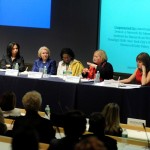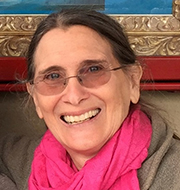 As we approach the end of International Women’s Month, I am reflecting on “the tipping point.” In so many ways we are at its cusp, with all sectors recognizing that the empowerment of women and girls is the critical component globally not just for social development but for economic and military security. Yet, in other ways we are not even close. Chris Grumm, director of the Women’s Funding Network (WFN), crystallized this at pivotal moment during one of the many events held at or concurrent with the UN session of the Commission on the Status of Women (CSW). She said “next year, bring a man with you and then we’ll really be at the tipping point.” Bingo! Her words echoed my disappointment that women were the overwhelmingly majority at most of the gatherings.
As we approach the end of International Women’s Month, I am reflecting on “the tipping point.” In so many ways we are at its cusp, with all sectors recognizing that the empowerment of women and girls is the critical component globally not just for social development but for economic and military security. Yet, in other ways we are not even close. Chris Grumm, director of the Women’s Funding Network (WFN), crystallized this at pivotal moment during one of the many events held at or concurrent with the UN session of the Commission on the Status of Women (CSW). She said “next year, bring a man with you and then we’ll really be at the tipping point.” Bingo! Her words echoed my disappointment that women were the overwhelmingly majority at most of the gatherings.
And, often women who I know, many for several decades: we were the choir preaching to ourselves. A week earlier, I’d been discussing this issue with Ginka Toegel, who heads “Breakthrough Strategies for Women Executives” at the international business school IMD where I soon will be Executive-in-Residence on Responsible Leadership.
Our work now must be about “connecting the dots” not only between genders but among all types of stakeholders. At the 20th anniversary symposium of the Center for Women’s Global Leadership (CWGL) honoring its founder Charlotte Bunche, some spoke of capitalism as an enemy to be destroyed. I believe it can be the most powerful engine for transformation when women truly are integrated fully into its decision-making and implementation gears.
Too many of the participants at events during the CSW represented governments and NGOs: not enough hailed from corporations. Each sector has something very unique and vital to offer. Through multi-sector partnerships, they each would benefit from the value-added of the other. We no longer can afford to keep the extraordinary pockets of breakthrough women’s empowerment initiatives throughout the world isolated and segregated: we need to become connected and mainstreamed.
During the CSW, member states of the UN General Assembly were analyzing vital proposals about Gender Equality Architecture Reform (GEAR), including creating a UN gender equality entity led by an Under-Secretary-General. In the US, President Obama appointed Melanne Verveer to serve as Ambassador-at-Large for Global Women’s Issues and Secretary of State Hillary Clinton has made certain that gender is included in every aspect of her work.
Indeed, we still have the need for safe spaces in which women leaders from all fields can share with each other their frustrations at and solutions to not being at the main table. Yet, until more men – from government, business and civil society – join in this conversation, we will remain marginalized on the sidelines.
Photo taken by Don Pollard Photography at the National Council for Research on Women (NCRW), event hosted at Goldman Sachs and sponsored by Deloitte & Touche.

